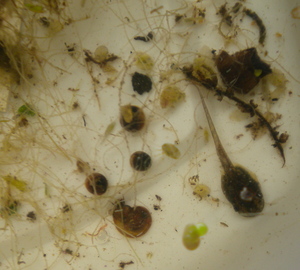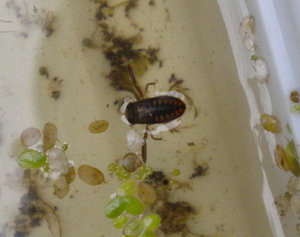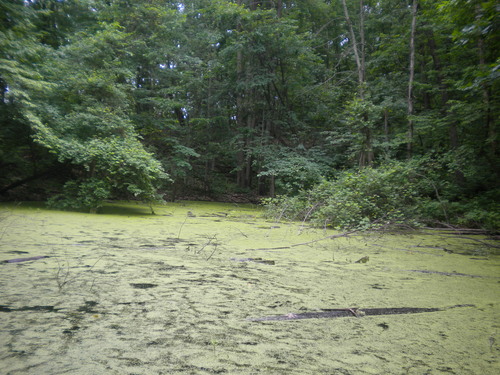Pondcast 23: A tadpole speaks
In this week's video pondcast, Jameson (age 3) and I discuss the life of tadpoles.
This article was contributed by my friend, Pseudacris c. crucifer, who is a tadpole. Cris has frequented most of our local ponds this spring.

A tadpole, aquatic snail, three clam shrimp, and a red non-biting midge larva.
For as far back as I can remember, say, perhaps 8 weeks, nearly hairless mammals ranging in size from 1-2 millimeters have been appearing overhead in the blue sky above Black Pond. I believe they are called humans (Homo sapiens). Unlike amphibians, juvenile humans (larvae) are similar to adults, but smaller and less hairy.
The humans have adapted to scientific research by developing detachable extensions on their hands that are green in color and rectangular in shape on the part that comes into the water. These extensions might be called “nets.” With these nets, the human larvae scoop me or one of my siblings into plastic containers, which are brought closer to their faces.
For reasons unknown, the human larvae become agitated when they discover that they have sampled me. Waving their appendages while displaying a single digit aimed at me, their eyes open wide, and their volume increases. Their calls bring additional human larvae and mature adults closer to my temporary habitation.
In the sample container, the world around me is bright, so I try to swim under a cluster of duckweed. I’m used to the dark waters of the pond, where I generally lay low at the bottom, resting on the layer of leaves. With my dark green, almost brown skin, I blend in.
I spend time in the shallow water of the pond since it’s warmer than the deeper areas. That way, my body temperature goes up and I grow faster.
Unlike the humans with their forward-facing eyes, my eyes are on the side of my head allowing me to see in nearly all directions. My eyesight is not complicated. I see movement and bright/dark. I’ll swim in short bursts to the darker areas if I see movement. I’ll keep swimming if my body feels something moving that is touching me.
In the pond, I have to beware of insects like water boatmen (who are usually plant eaters, but do enjoy the taste of tadpoles), backswimmers, predacious diving beetle larvae and adults, and other tadpoles.

A water boatman, a pond insect that usually eats plants, but does also eat tadpoles.
I’m not afraid of anything, for fear is not in my vocabulary. Remember, I have a simple brain that has no area for complex thought, like emotions. I react. I don’t plan. I see motion, so I stop moving and try to blend in with my surroundings. If the motion gets closer, I will swim away. When I grow up, when I see motion, do what I did as a youth, I’ll first stop moving and blend in with my surroundings, then I’ll jump to the safety of the water, unless I’m out in the tall plants or trees surrounding the pond. Then I’ll jump onto safety in the leaf litter and blend in there.
What do I think about? Not much. Most of the time, I think of food and avoiding sudden movements around me. When I grow up, each spring I’ll think about finding a mate, since that’s what my body chemistry tells me to do.
If I’ve eaten everything around me, I swim around to find a new source of algae and small pieces of dead plants in the pond. When I get bigger and develop legs and lose my tail, I’ll transition to a protein-based diet, consisting of insects and other small invertebrates that move enough for me to see them.
I react to the seasonal changes in my body. In the fall, my body temperature drops, so I’ll bury myself in soil or head under logs and leaves. My body will produce a chemical, called glycerol, so my cells won’t freeze in winter. When the spring rains come and thaw out the ground and pond, I’ll become active again.
In the spring, as an adult, I’ll look for a mate. I don’t know yet if I’m a male or a female. Females are bigger than males so they can produce lots of eggs. But males have skin on their chin, called a vocal sac, so they can call each spring and summer to let others of my kind know that there is enough water to lay eggs. Our call is a really loud, high-pitched “Peep!” The deeper the call is, the older the male, and the greater chance of finding a mate. Sometimes, though, other males will intercept a female on their way to the old guy, tricking her into mating with them instead.
Human skin allows these creatures to inhabit a variety of non-water-based ecosystems. Whereas amphibians must keep their skin moist at all times. Right now, my skin is entirely wet since I live in the pond. Until I grow up and develop lungs, I get all my oxygen from the water. As an adult, I’ll be more active at night since I won’t be seen by predators or dry out as quickly as I would in the heat of the day. But as an adult, I’ll have to stay near damp places, like ponds, under logs, or in the soil that way my skin will not dry. My skin is also sensitive and can absorb chemicals, such as bug spray. Why would humans want to keep such a valuable food source, like insects, away from them?
Unlike human larvae who look a lot like their adults, I’ll start to change in the upcoming weeks. Soon, I’ll grow legs and develop lungs. My tail will become part of my body. I will shed my skin at some point and may even eat it as one of my first adult meals. I can’t wait.
But now, my face is becoming tired of pressing all the buttons on my keyboard. So I had better take a break. Perhaps I’ll see you humans at the pond. Bring your larvae; they’ll have a good time.

Black Pond on June 11.
To identify tadpoles you find in Michigan, download the Michigan LP Tadpole Guide.
You can see all the Pondcast videos by visiting the YouTube channel of Stefan Szumko, AKA slugwhisperer at http://www.youtube.com/user/slugwhisperer.
Stefan Szumko is a middle school science teacher by trade, an outdoor environmental educator by calling, and a homedaddy by choice. He can be reached at slugwhisperer@gmail.com.

